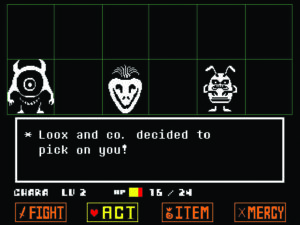I Dream In Pixels: I’m tired of killing

It was a few days before leaving for Thanksgiving break that I found myself lying in bed with my heartbeat thumping in my ear. Nothing was happening. I was alone, staring blankly at my roommate’s bed. But as has begun to happen with increased frequency, my anxiety had taken over my body, and it was all I could do to refrain from hyperventilating and potentially passing out.
I wouldn’t pretend that the 2016 presidential election is solely responsible for the recent collapse of my mental health, but it has certainly done me no favors. Prior to Nov. 8, my anxieties were precariously stacked like some sort of cerebral “Jenga” game. I was in no way “fine,” but I was coping to the best of my ability. In some ways, I had begun to crawl out of the abyss, but then the election happened, Trump happened and, well, here we are.
Throughout most of my life, video games have offered a sort of media therapy. Where books and movies proved too passive to distract me from my depression, games allowed me to pour myself into a world, a task, a new identity free from my own problems. There is an argument to be made for choosing to zone out rather than resolve mental health issues, but when you are a teenager isolated from the world, you make do with what you have.
It has been hard for me to similarly lose myself to a game in the aftermath of this election. In a time when all I can think of is the coming storm in January, I have been desperately seeking some respite from the fears that plague me at all hours, strangling me as I attempt to move forward with some sense of normality. But where once games provided me support, now they only reflect back at me the horrors of the real world.
It has long been an issue of the games industry that, despite improvements in all areas of design, the vast majority of games continue to revolve around the same grim task: killing. I should come now and say that I am not intending to wage a Fox News-esque crusade against video game violence.
Violence is a fact of life, and it’s important to be able to explore it in an environment removed from real world casualties. What I am finding increasingly hard to swallow, though, is just how disproportionately violence is treated as the default for games.
A few weeks ago, Brie Code published an article on gamesindustry.biz discussing the failure of the games industry to broaden the variety of games produced to appeal to different audiences, and her words have been echoing in my head continuously as I’ve been searching for a game to ease my troubled mind.
“I’m not remotely interested in shockingly good graphics, in murder simulators, in guns and knives and swords,” Code wrote. “There is enough fear and hatred in the world to get my heart pounding. My Facebook feed and Twitter feed are enough for that.”
I had already begun to feel distaste at the grotesque violence so prevalent in games before the election, but now it is to a point where games have become yet another source of anxiety. I can no longer disconnect my mind when gunning down enemies in “Call of Duty,” or decapitating guards in “Dishonored.”
I am hyperaware of every body cast aside, each death reminding me of all the real people discarded without a second thought. I’m reminded of dead black bodies used as newsfeed b-roll, of trans people killed in parking lots and of the 1 in 3 women who experience sexual violence in their life.
In comparison to these atrocities, comparing them to video games is an almost disgusting appropriation. But this is the state of games today. The cruelty of the world is now routinely glamorized and sold as mass entertainment. To kill someone in a game is no longer shocking—It’s expected.
I am not out to rid the world of violent games, but I do think it is important to realize what politics the media we consume endorses. Video games are a beautiful, transcending medium, yet we use them primarily to reaffirm and normalize war and suffering. Perhaps there will come a time in the future when I can once again put a distance between games and the real world and enjoy the games that now cause me such distress. But until then, I am tired of killing. I am tired of the pain. I am tired.

